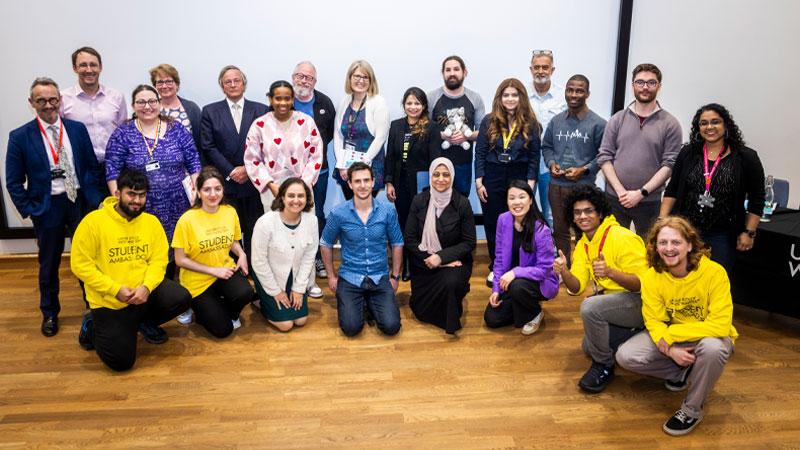Following becoming the FameLab Hub last year, the University of Westminster has seen the London finalists in the FameLab science communication competition battle it out at the University’s Little Titchfield Street site on 2 April. Tiffany Baptiste from King’s College London emerged as the winner, and she went on to win national runner-up in the finals on 6 June.

Hosted by TV personality and pyrotechnician Fran Scott and judged by Robin Ince, comedian, author and co-host of The Infinite Monkey Cage; Suze Kundu, Science communicator, nanochemist and broadcaster; Geoffrey Guy, Chairman of The Guy Foundation; and Catherine Loveday, Professor of Neurophysiology at the University of Westminster, the London Final was organised to send the most deserving science communicator to the UK FameLab Final at Cheltenham Science Festival on 6 June. The judges made their decisions based on content, clarity and charisma.
FameLab is the world’s largest science communication competition, designed to find and support the next generation of science leaders. Contestants have just three minutes to explain a scientific, engineering, mathematical or social science concept in an engaging and accessible way, without PowerPoint or notes.
On FameLab’s 20th anniversary the London finalists included University of Westminster researchers Success Ajayi, Khalid Akram, Yasmine Baidi and Manal Mohammed; University College London researcher Irinie Roufaeel; Tiffany Baptiste from King's College London; Imperial College London researchers Fangyue Chen and Sam Horrell; and James Cash from Lilian Baylis Technology School.
The event was kicked off by Fran Scott, followed by a welcome from University of Westminster Deputy Vice-Chancellor for Research and Knowledge Exchange Professor Andrew Linn and a keynote speech by Robert Ince on the significance of science communication in tackling ignorance in the world.

Professor Andrew Linn with winner Tiffany Baptiste
While wearing her heart on her sleeve, King's College London’s Tiffany Baptiste wowed the judges with the broken heart syndrome, a stress-induced heart condition that mainly affects women. She highlighted how personalised computer models of the heart, known as digital twins, could help doctors better understand and treat this and other under-researched condition, and she won first place. Later on she also won national runner-up and the audience prize at the FameLab final on 6 June.
She said: “Taking part in FameLab was an incredible experience! It challenged me to turn a complex topic like cardiac digital twins into something clear, compelling, and even a little emotional. Sharing the science behind broken heart syndrome and how virtual hearts can help us understand real patients, especially women, was a powerful reminder of why public engagement matters so much.”
Sam Horrell, Structural Biology Facilities Manager at Imperial College London, was one of the two runners-up and the audience’s favourite. He compared making molecular movies of proteins in action with taking pictures of a falling cat to see how it lands on its feet.
He said: “FameLab was great fun, I couldn't recommend it highly enough to anyone who is interested in giving science communication a go. Couldn't ask for a better, more supportive team organising the trainings and events”.

Success Ajayi
Success Ajayi, Doctoral Researcher in Physiology at the University of Westminster, was also a runner-up. His PhD investigates cardiovascular adaptations—particularly heart rate dynamics and related indices—in response to endurance exercise.
Success said: “Participating in FameLab has been an exhilarating journey. It challenged me to communicate complex science in a relatable way and reminded me of the value of consistent practice. As a doctoral student at Westminster, I feel fortunate to be part of a community that values academic excellence and public engagement.”
Suze Kundu, recently appointed as Community Engagement Consultant at NASA’s Science Explorer, and a seasoned FameLab judge, said: "It was great to see the return of FameLab's London competition, and in its new home of the University of Westminster. The competition was a reminder of not only the amazing research going on in the UK's capital, but the fantastic people behind the lab bench. From spinning cats to superbugs, it was a great opportunity to listen to and learn from the future of research. Thanks to Anna Christodoulou for bringing back FameLab. Long may it continue to be a feature in Westminster's calendar! Congratulations to all participants."
University of Westminster Deputy Vice-Chancellor for Research and Knowledge Exchange Professor Andrew Linn said: “187 years ago ‘an institution where the public, at little expense, may acquire practical knowledge of the various arts and branches of science’ was founded at 309 Regent Street. This was the Royal Polytechnic Institution, now known as the University of Westminster. Sharing scientific innovation with the public is our founding principle and that is why the University of Westminster is the proud and natural FameLab Hub for London.”
Being the FameLab Hub directly contributes to the United Nations Sustainable Development Goals (SDGs) 4: Quality Education, 8: Decent Work and Economic Growth and 17: Partnerships for Goals. Since 2019, the University of Westminster has used the SDGs holistically to frame strategic decisions to help students and colleagues fulfil their potential and contribute to a more sustainable, equitable and healthier society.
Find out more about research at the University of Westminster.









